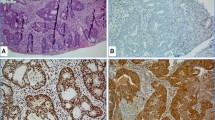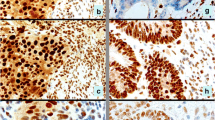Abstract
Objective
Recent studies defend a possible prognostic and therapeutic value of the identification of microsatellite instability (MSI) in colorectal cancer. This work tries to assess the impact that the identification of MSI tumours can have in clinical practice.
Material and methods
We recovered tumour samples from 92 of the 143 patients operated on for colorectal cancer in our institution between 1995 and 2000. Five MSI markers (BAT 25, BAT 26, D2S123, D5S346 and D17S250) were studied on them. The rate and clinicopathologic characteristics of MSI tumours were investigated along with their impact on the global and disease-free survival as compared with microsatellite stable (MSS) tumours.
Results
All 5 microsatellite markers’ status were established in 73 patients (79.3% of the samples). Among them, 7 tumours showed instability in just one marker (low microsatellite instability [MSI-L]) whereas 5 tumours had mutations in 2 or more markers (high microsatellite instability [MSI-H]), for a total 15.4% rate of MSI tumours. All MSI-H tumours were located in the right colon. We could not find any impact from MSI detection on global or disease-free survival.
Conclusions
MSI determination did not identify groups of patients with a different prognosis. Moreover, with such low incidence its determination can only be justified in those cases that fulfill Bethesda’s criteria to identify families with Lynch’s syndrome.
Similar content being viewed by others
References
Rodriguez-Bigas MA, Boland CR, Hamilton SR et al (1998) A National Cancer Institute Workshop on Hereditary Nonpolyposis Colorectal Cancer Syndrome: meeting highlights and Bethesda guidelines. J Natl Cancer Inst 89:1758–1762. Comment in: J Natl Cancer Inst 1998;90:939–940
Perucho M (1996) Cancer of the microsatellite mutator phenotype. Biol Chem 377:675–684
Sinicrope FA, Rego RL, Foster N et al (2006) Microsatellite instability accounts for tumour site-related differences in clinicopathologic variables and prognosis in human colon cancers. Am J Gastroenterol 101:2818–2825
Jo WS, Carethers JM (2006) Chemotherapeutic implications in microsatellite unstable colorectal cancer. Cancer Biomark 2:51–60
Casado E, De Castro J, Belda-Iniesta C et al (2007) Molecular markers in colorectal cancer: genetic bases for a customised treatment. Clin Transl Oncol 9:549–554
Umetani N, Sasaki S, Watanabe T et al (2000) Diagnostic primer sets for microsatellite instability optimized for a minimal amount of damaged DNA from colorectal tissue samples. Ann Surg Oncol 7:276–280
Marsoni S (2001) International Multicenter Pooled Analysis of Colon Cancer Trials Investigators. Efficacy of adjuvant fluorouracil and leucovorin in stage B2 and C colon cancer. International Multicenter Pooled Analysis of Colon Cancer Trials Investigators. Semin Oncol 28[1 Suppl 1]:14–19
Wolmark N, Colangelo L, Wieand S (2001) National Surgical Adjuvant Breast and Bowel Project trials in colon cancer. Semin Oncol 28[1 Suppl 1]:9–13
Aranda E, Abad A, Carrato A et al; TTD Group (2006) Guides for adjuvant treatment of colon cancer. TTD Group (Spanish Cooperative Group for Gastrointestinal Tumour Therapy). Clin Transl Oncol 8:98–102
Chang SC, Lin JK, Yang SH et al (2006) Relationship between genetic alterations and prognosis in sporadic colorectal cancer. Int J Cancer 118:1721–1727
Lim SB, Jeong SY, Lee MR et al (2004) Prognostic significance of microsatellite instability in sporadic colorectal cancer. Int J Colorectal Dis 19:533–537
Ward RL, Cheong K, Ku SL et al (2003) Adverse prognostic effect of methylation in colorectal cancer is reversed by microsatellite instability. J Clin Oncol 21:3729–3736
Bubb VJ, Curtis LJ, Cunningham C et al (1996) Microsatellite instability and the role of hMSH2 in sporadic colorectalcancer. Oncogene 12:2641–2649
Chen WS, Chen JY, Liu JM et al (1997) Microsatellite instability in sporadic-colon-cancer patients with and without liver metastases. Int J Cancer 74:470–474
Halling KC, French AJ, McDonnell SK et al (1999) Microsatellite instability and 8p allelic imbalance in stage B2 and C colorectal cancers. J Natl Cancer Inst 91:1295–1303
Sinicrope FA, Rego RL, Halling KC et al (2006) Prognostic impact of microsatellite instability and DNA ploidy in human colon carcinoma patients. Gastroenterology 131:729–737
Lanza G, Gafà R, Santini A et al (2006) Immunohistochemical test for MLH1 and MSH2 expression predicts clinical outcome in stage II and III colorectal cancer patients. J Clin Oncol 24:2359–2367
Westra JL, Plukker JT, Buys CH, Hofstra RM (2004) Genetic alterations in locally advanced stage II/III colon cancer: a search for prognostic markers. Clin Colorectal Cancer 4:252–259
Benatti P, Gafà R, Barana D et al (2005) Microsatellite instability and colorectal cancer prognosis. Clin Cancer Res 11:8332–8340. Erratum in: Clin Cancer Res 2006;12:3868–3869
Carethers JM, Smith EJ, Behling CA et al (2004) Use of 5-fluorouracil and survival in patients with microsatellite-unstable colorectal cancer. Gastroenterology 126:394–401
Jover R, Zapater P, Castells A et al; Gastrointestinal Oncology Group of the Spanish Gastroenterological Association (2006) Mismatch repair status in the prediction of benefit from adjuvant fluorouracil chemotherapy in colorectal cancer. Gut 55:848–855
Ricciardiello L, Ceccarelli C, Angiolini G et al (2005) High thymidylate synthase expression in colorectal cancer with microsatellite instability: implications for chemotherapeutic strategies. Clin Cancer Res 11:4234–4240
Lamberti C, Lundin S, Bogdanow M et al (2007) Microsatellite instability did not predict individual survival of unselected patients with colorectal cancer. Int J Colorectal Dis 22:145–152
Wang C, van Rijnsoever M, Grieu F et al (2003) Prognostic significance of microsatellite instability and Ki-ras mutation type in stage II colorectal cancer. Oncology 64:259–265
Westra JL, Schaapveld M, Hollema H et al (2005) Determination of TP53 mutation is more relevant than microsatellite instability status for the prediction of disease-free survival in adjuvant-treated stage III colon cancer patients. J Clin Oncol 23:5635–5643
Malesci A, Laghi L, Bianchi P et al (2007) Reduced likelihood of metastases in patients with microsatellite-unstable colorectal cancer. Clin Cancer Res 13:3831–3839
Hemminki A, Mecklin JP, Järvinen H et al (2000) Microsatellite instability is a favorable prognostic indicator in patients with colorectal cancer receiving chemotherapy. Gastroenterology 119:921–928
Elsaleh H, Powell B, McCaul K et al (2001) P53 alteration and microsatellite instability have predictive value for survival benefit from chemotherapy in stage III colorectal carcinoma. Clin Cancer Res 7:1343–1349
Watanabe T, Wu TT, Catalano PJ et al (2001) Molecular predictors of survival after adjuvant chemotherapy for colon cancer. N Engl J Med 344:1196–1206
Ribic CM, Sargent DJ, Moore MJ et al (2003) Tumour microsatellite-instability status as a predictor of benefit from fluorouracil-based adjuvant chemotherapy for colon cancer. N Engl J Med 349:247–257
Barratt PL, Seymour MT, Stenning SP et al; UKCCCR AXIS trial collaborators (2002) Adjuvant X-ray and Fluorouracil Infusion Study. DNA markers predicting benefit from adjuvant fluorouracil in patients with colon cancer: a molecular study. Lancet 360:1381–1391
Storojeva I, Boulay JL, Heinimann K et al (2005) Prognostic and predictive relevance of microsatellite instability in colorectal cancer. Oncol Rep 14:241–249
Kim GP, Colangelo LH, Wieand HS et al; National Cancer Institute (2007) Prognostic and predictive roles of high-degree microsatellite instability in colon cancer: a National Cancer Institute-National Surgical Adjuvant Breast and Bowel Project Collaborative Study. J Clin Oncol 25:767–772
Popat S, Hubner R, Houlston RS (2005) Systematic review of microsatellite instability and colorectal cancer prognosis. J Clin Oncol 23:609–618
des Guetz G, Mariani P, Cucherousset J et al (2007) Microsatellite instability and sensitivitiy to FOLFOX treatment in metastatic colorectal cancer. Anticancer Res 27:2715–2719
Author information
Authors and Affiliations
Corresponding author
Rights and permissions
About this article
Cite this article
Barrasa Shaw, A., López-Guerrero, J.A., Calatrava Fons, A. et al. Value of the identification of microsatellite instability in colorectal cancer. Clin Transl Oncol 11, 465–469 (2009). https://doi.org/10.1007/s12094-009-0386-y
Received:
Accepted:
Published:
Issue Date:
DOI: https://doi.org/10.1007/s12094-009-0386-y




